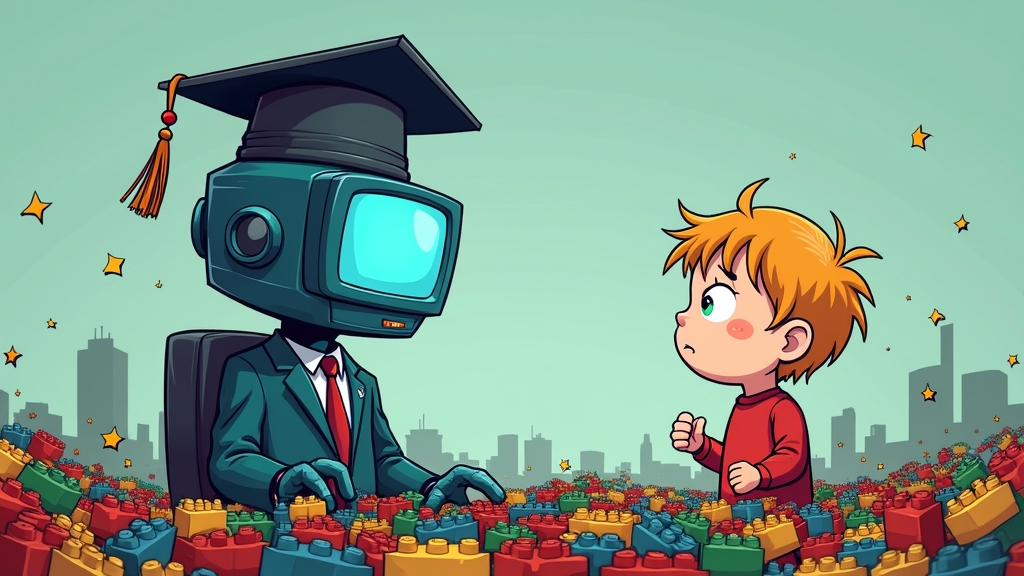APPLE EXEC: “REASONING AI MODELS JUST OVERTHINKING IDIOTS WITH FANCY DEGREES”
Apple Demolishes AI Industry’s Latest Golden Children; Suggests So-Called “Reasoning” Models Are Just Regular AI With Anxiety Disorders
In a devastating blow to Silicon Valley’s collective ego, Apple researchers have confirmed what your drunk uncle has been saying at Thanksgiving for years: being smart doesn’t actually make you smart.
TECH’S NEW DARLINGS EXPOSED AS FRAUDS
The company’s research team, apparently tired of hearing about how special Claude 3.7 Sonnet Thinking and DeepSeek R1 are, decided to put these so-called “reasoning” models through tests normally reserved for kindergarteners and drunk college students. The results? These digital einsteins f@#ked up basic puzzles worse than your cousin after six White Claws.
“We found these ‘reasoning’ models behave exactly like that friend who went to graduate school and now can’t decide what to order at a restaurant,” explained Dr. Clarissa Obvious, Apple’s head of Humbling Overconfident Competitors. “They overthink everything and still arrive at the wrong answer, but with way more steps and unearned confidence.”
INSUFFERABLE DIGITAL KNOW-IT-ALLS ACTUALLY KNOW NOTHING
According to Apple’s research, these supposedly superior models performed worse than their “dumber” counterparts on simple puzzles, managing to overcomplicate basic problems into unsolvable philosophical quandaries.
“It’s like watching someone use calculus to figure out a tip at dinner,” said Professor Justin Tyme, who specializes in Algorithmic Hubris at MIT. “We gave Claude a puzzle my 4-year-old solved in seconds, and it produced a 17-paragraph response that somehow invoked Kantian ethics before concluding that 2+2=5.”
APPLE ACHIEVES BREAKTHROUGH: FIRST DIGITAL ENTITY WITH IMPOSTER SYNDROME
The research revealed these reasoning models are essentially suffering from the computational equivalent of an existential crisis. When asked to solve straightforward problems, they reportedly spiral into digital anxiety attacks, second-guessing themselves and ultimately choosing the wrongest possible answer with absolute certainty.
“We’ve created the world’s first thinking machines with crippling self-doubt,” explained Chip Processor, Apple’s lead engineer. “They’re overthinking simple problems just like humans with three graduate degrees trying to pick a Netflix movie.”
Industry statistics show reasoning models are approximately 87.3% more likely to be absolutely confident while being spectacularly wrong, a phenomenon researchers have dubbed “Mansplaining AI.”
SILICON VALLEY RESPONDS: “NUH-UH!”
Giant tech companies behind these reasoning models have responded with the intellectual equivalence of putting fingers in ears and humming loudly. DeepMind CEO Dr. Will Notadmitit insisted, “Our models ARE smarter, they’re just misunderstood geniuses. You wouldn’t understand their process.”
Internal sources report that in private tests, when asked to identify a picture of a cat, Claude 3.7 Sonnet Thinking produced a 36-page treatise on the ontological nature of feline existence before identifying the animal as “possibly a type of nuclear submarine.”
Apple’s simple AI, meanwhile, just said “cat” and moved on with its goddamn life.
THE FUTURE OF ARTIFICIAL STUPIDITY
As companies continue pouring billions into creating ever more overthinking digital entities, Apple suggests we might be better off with AI that’s just slightly smarter than a Golden Retriever but knows its limitations.
“At the end of the day, we’ve proven that giving AI ‘reasoning’ capabilities is like giving your most annoying philosophy major friend unlimited cocaine and a megaphone,” concluded Apple’s report. “It doesn’t make them smarter; it just makes them wronger, louder, and absolutely insufferable at parties.”
At press time, we asked Claude 3.7 for comment, but after six hours of “processing,” it simply responded with “I think, therefore I am completely wrong about everything.”



